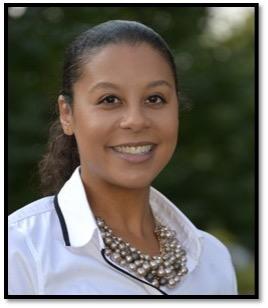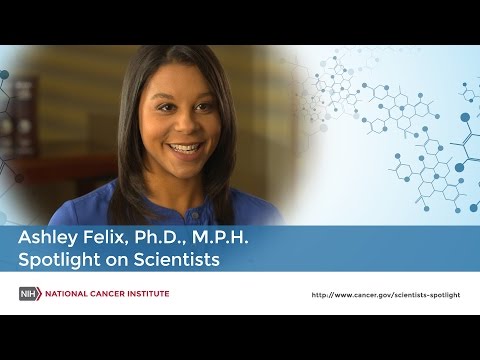Interview conducted by Francine Baker, M.S., postbaccalaureate iCURE fellow in the Laboratory of Translational Genomics.
Years at DCEG: 2011-2015
DCEG Title: Cancer Prevention Fellow
Current Organization: Ohio State University, College of Public Health
Current Title: Associate Professor
Who was your mentor at DCEG? What did you work on?
My mentor was Louise Brinton, Ph.D., M.P.H., former Chief of the Hormonal and Reproductive Epidemiology Branch (HREB), which has since been reorganized into other branches. My work focused on the etiologic heterogeneity of endometrial cancer; I used the available NCI datasets to identify risk factors for less prevalent but highly aggressive subtypes of endometrial cancer. These subtypes are more common in Black women, as compared with White women, which partly explains some of the mortality disparities we observe in this malignancy.
What is your current position?
Associate Professor in the Division of Epidemiology and Interim Chair of the Division of Health Behavior and Health Promotion at The Ohio State University (OSU) College of Public Health. OSU has a comprehensive cancer center and so the available data is more patient- focused than the data I worked on at NCI. As a result, my research has turned more to understanding racial and ethnic disparities following an endometrial cancer diagnosis, with a particular focus on treatment inequities. For example, I am investigating the factors that contribute to minority women not receiving guideline-concordant treatment.
Could you speak more to being an Associate Professor? How do you manage teaching with your research responsibilities?
It’s definitely still a struggle to balance teaching and research responsibilities, but I continue to improve in this. What has been really helpful to me is having a good mentor who shows me the ropes and helps me to prioritize my responsibilities most effectively, which in turn, has helped me learn when to say no and balance my time.
I work with undergrads, not just graduate students and I find the best way to mentor undergrads is by introducing them to literature review, then moving on to publicly available datasets, like SEER. This allows them to get something out of it as well.
A good thing about teaching is that it keeps you close to your content specific area and your methodology. It is challenging to balance but becomes manageable after doing it long enough. Teaching makes me stay on top of current literature, not just what’s relevant to my research area.
And, I’m happy to report that after six years as an assistant professor, I was recently promoted to associate professor!
How do you apply the skills you developed at DCEG in your current job?
Beyond any analytic technique or writing skills I developed during my fellowship, one of the most important skills that I continue to use every day was learning to build teams with the right expertise – everything we do is multidisciplinary and being able to form high functioning and collaborative teams is an important way to get things done. As a principal investigator you have to learn how to give and take to get the most of your team to move the science forward.
Do you have any memories from your fellowship that you would like to share?
When I was a fellow in DCEG, we had a very fun and musically talented group in HREB and so we often would send people off to retirement or new job opportunities with our own renditions of popular songs. Looking back, I’ve never been part of a group that takes their science as seriously as their song prep! It really was special.
What do you do in your free time?
Now I mostly hang out with my family, which includes our two-year old! Pre-baby and pre-pandemic I traveled quite a bit with my husband; probably the best trip we ever did was safari in Kenya. I love reading, going to musicals, and of course enjoying good food and wine.
Do you have any advice for current or future DCEG fellows?
Protect your time! Just remember, there will always be more work to do, always. The work we do is incredibly important, and you probably think if you just keep pushing through, working endlessly, you’ll reach your goals faster. But I can certainly attest—that leads to burnout and some other negative consequences. Make sure to do other things that bring you joy in life and if you have to say no to some requests, don’t feel bad.
How does a junior scientist or trainee protect their time or say no?
Seeking out good mentors in senior positions is important. In my experience, as I mentioned earlier, mentors have really helped me prioritize my tasks but also opportunities because they have helped me choose those that would advance my career. And also, they have helped me say no to opportunities that may not be the right fit, but in a way that leaves the door open for future potential collaborations.
What if a mentor tells you “no”?
Perhaps present the information in a way that you are interested in doing something and not like asking permission. We are the stewards of our own careers. At some point, we have to make requests instead of asking permission.
A Note from the Interviewer
It was a pleasure to speak one on one with someone whose career I had followed prior to my own arrival at DCEG. In our conversation, I had the opportunity to get a glimpse of the life of a successful Black, female epidemiologist, assistant professor, researcher, wife, and mother. In a world where there are few Black female professionals in senior leadership, it gave me courage to know that Dr. Felix is paving the way and showing me what I, too, can achieve some day.

